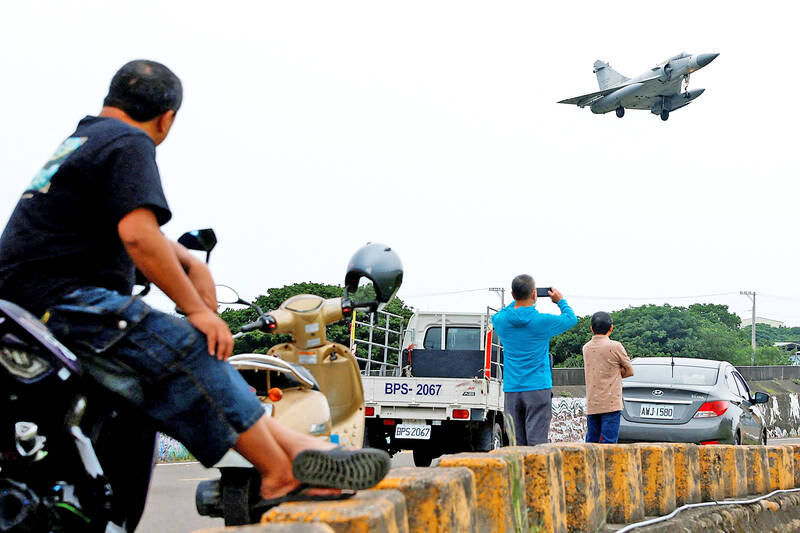China held military drills last week around Taiwan as part of its intimidation tactics, since it is not powerful enough to launch a war against the nation, a US-based professor said on Wednesday.
The Taipei Economic and Cultural Office in Atlanta and the University of South Carolina Walker Institute of International and Area Studies held a conference on Wednesday to discuss the latest developments in the US-Taiwan relationship and the Indo-Pacific, the office said in a press release yesterday.
As this year marks the 45th anniversary of the US’ Taiwan Relations Act and Taiwan’s new government took office earlier this month, political experts were invited to provide their insights and suggestions, it said, adding that about 200 people participated either in-person or virtually.

Photo: Carlos Garcia Rawlins, Reuters
China relies on imports for food and energy, so international sanctions — which would likely be imposed if Beijing were to invade Taiwan — would cause significant harm to its people’s livelihood and economy, University of South Carolina political science professor Hsieh Fu-sheng (謝復生) said.
The “Joint Sword-2024A” exercises Beijing launched around the nation following President William Lai’s (賴清德) inauguration were a part of its consistent strategy of intimidating Taipei, Hsieh said, adding that China is currently not strong enough to rashly start a war.
The exercises not only threatened Taiwan, but also the Western democracies, said Michael Beckley, Tufts University political science associate professor and author of Danger Zone: The Coming Conflict with China.
It would be impossible to predict when and if China would use force against Taiwan in the short term, but one should never expect China to bring peace, Beckley said.
The Taiwan issue is on Chinese President Xi Jinping’s (習近平) priority list, he said.
Xi would not hesitate to invade just because Taiwan is a hub for chip manufacturing, Beckley added.
Taipei and Washington strengthening military cooperation might be the only chance to make Xi put off the issue, he said.
In conflicts between China and the US, political, diplomatic and military factors far outweigh commercial considerations, said Philip Chritton, a visiting academic at the University of South Carolina Darla Moore School of Business.
The Taiwan Relations Act promulgated in 1979 has been indispensable to the close relations between Taiwan and the US, office Director-General Elliot Wang (王翼龍) said.
The Emergency National Security Supplemental Appropriations Act passed by the US Congress last month was a “clear example” of strong international support for stability and security in the Taiwan Strait, Wang said.
“Taiwan plays an indispensable role in the international community,” he added.

The first global hotel Keys Selection by the Michelin Guide includes four hotels in Taiwan, Michelin announced yesterday. All four received the “Michelin One Key,” indicating guests are to experience a “very special stay” at any of the locations as the establishments are “a true gem with personality. Service always goes the extra mile, and the hotel provides much more than others in its price range.” Of the four hotels, three are located in Taipei and one in Taichung. In Taipei, the One Key accolades were awarded to the Capella Taipei, Kimpton Da An Taipei and Mandarin Oriental Taipei. Capella Taipei was described by

EVA Airways today confirmed the death of a flight attendant on Saturday upon their return to Taiwan and said an internal investigation has been launched, as criticism mounted over a social media post accusing the airline of failing to offer sufficient employee protections. According to the post, the flight attendant complained of feeling sick on board a flight, but was unable to take sick leave or access medical care. The crew member allegedly did not receive assistance from the chief purser, who failed to heed their requests for medical attention or call an ambulance once the flight landed, the post said. As sick

The Taichung District Court yesterday confirmed its final ruling that the marriage between teenage heir Lai (賴) and a man surnamed Hsia (夏) was legally invalid, preventing Hsia from inheriting Lai’s NT$500 million (US$16.37 million) estate. The court confirmed that Hsia chose not to appeal the civil judgement after the court handed down its ruling in June, making the decision final. In the June ruling, the court said that Lai, 18, and Hsia, 26, showed “no mutual admiration before the marriage” and that their interactions were “distant and unfamiliar.” The judge concluded that the couple lacked the “true intention of

A drunk woman was sexually assaulted inside a crowded concourse of Taipei Railway Station on Thursday last week before a foreign tourist notified police, leading to calls for better education on bystander intervention and review of security infrastructure. The man, surnamed Chiu (邱), was taken into custody on charges of sexual assault, taking advantage of the woman’s condition and public indecency. Police discovered that Chiu was a fugitive with prior convictions for vehicle theft. He has been taken into custody and is to complete his unserved six-month sentence, police said. On Thursday last week, Chiu was seen wearing a white